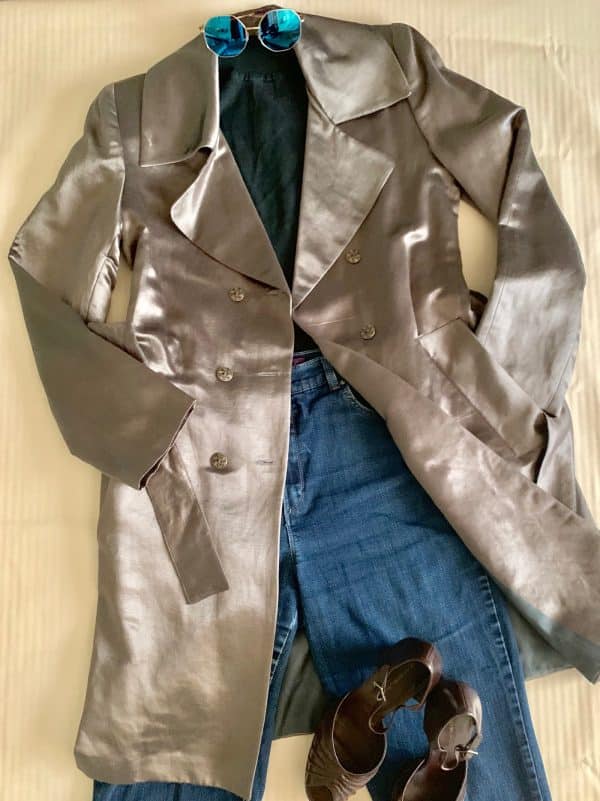 Hemp Jacket, Peace Silk Top, Organic Cotton Jeans STUDIOSKB
Hemp Jacket, Peace Silk Top, Organic Cotton Jeans STUDIOSKB
Sew Green: Sewing Eco-Fabrics
Bamboo isn’t something you grow in your garden. Today, it is something you sew.
With good reason. Bamboo and “green” or ecofabrics bring new, interesting textures, drape and performance with a twist of being earth-friendly.
Here are six of the most popular green fabrics on the market today – plus two more coming your way. I’ll show you what makes them green, the pros and cons of each and how to sew them.
At the end you’ll find a list of places where you find eco-fabrics online.
SBA: Ecofabrics: Not a fashion fad
Creating clothes from eco-fabrics has captured the apparel industry’s imagination. According to the Organic Trade Association, sales of organic fibers grew to $85 million in 2013, an increase of about 23 percent from 2012. They expect sales in the U.S. to grow by nearly 16 percent a year.
SBA: What makes a fiber green? At least one of these:
- Chemical-free. No synthetic pesticides, fertilizers, genetic engineering or toxic chemicals to process and dye the fibers.
- Closed-loop processing. Solvents needed to break woody fibers into weavable filaments are reused and kept out of the environment, saving energy and water.
- Eco-fabrics break down since they are natural fibers and contain little or no petroleum by-products.
- Regenerated or renewable content. Some fabrics use recycled plastic bottles. Others use recycled cotton or polyester.
- Animal friendly. For wool, this means sheep cannot be overgrazed, dipped in insecticides, exposed to pesticides and hormones or scalped on the hindquarters to prevent blowflies.
- To this list, many would add fair labor practices. They’d also want manufacturing placed close to consumers to save transportation costs and fossil fuel pollution.
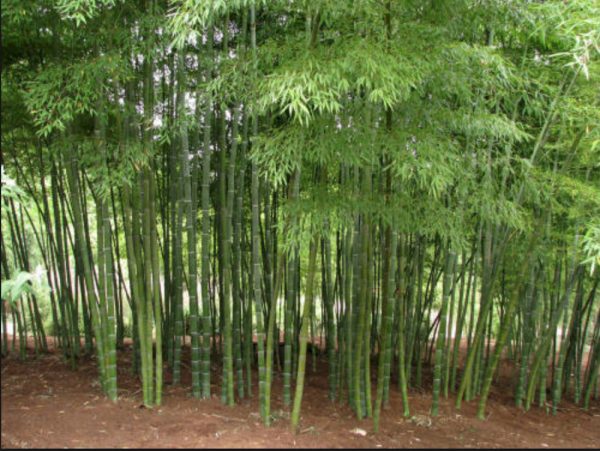 BAMBOO is a fast-growing grass. It doesn’t need fertilizers, pesticides or herbicides and regrows quickly after harvest. Most is pulped into fibers with chemicals in a patented process held by one factory in China. A newer, greener process creates a more linen-like bamboo. The plant is wild harvested or farmed on plantations.
BAMBOO is a fast-growing grass. It doesn’t need fertilizers, pesticides or herbicides and regrows quickly after harvest. Most is pulped into fibers with chemicals in a patented process held by one factory in China. A newer, greener process creates a more linen-like bamboo. The plant is wild harvested or farmed on plantations.
Bamboo wicks. It draws moisture away from the body. Bamboo insulates. It keeps the body warm in the winter and cool in the summer. Bamboo is anti-microbial. It kills odor-causing bacteria. Bamboo is soft and silky. It does not irritate the skin.
- Fabrics: Jersey and double knits, French terry, shirting (in a dobby weave), denim, corduroy and velvet. Jersey and blended knits with 3 or 5 percent spandex – called bambino – are easiest to find.
- Best use: Drapey tops and dresses. The jersey is thin. Plan to wear a slip or line with another layer of bamboo or tricot. It is not durable so it is not suitable for children’s wear or activewear. For a more opaque and durable knit buy bambino or a double knit.
- Sewing tips: Treat jersey like any other jersey, other bamboo knits as an interlock.
Treat bamboo shirting as you would a fine cotton. Sew with size 10 universal needles and a stitch length of 2.5. On denim, corduroy or velvet, use size 12 universal needles and a stitch length of 3.0.
- Care: Wash on gentle cycle in cold water. Lay knits flat to dry. Hang wovens to dry.
 HEMP has been used to weave ropes and make apparel since the Stone Age. It is cultivated nearly everywhere in the world except, until recently, the U.S. Most hemp fabric comes to U.S. through Canada.
HEMP has been used to weave ropes and make apparel since the Stone Age. It is cultivated nearly everywhere in the world except, until recently, the U.S. Most hemp fabric comes to U.S. through Canada.
It resists disease and pests, doesn’t need fertilizers and grows in almost any quality of soil and needs very little water to grow. It is soaked in water then pulped into fiber.
Hemp insulates. It wicks moisture. It blocks ultraviolet rays. It resists bacteria and mold. It is the strongest natural fiber known.
- Fabrics: Wovens and knits. Hemp can be blended with cotton, linen or silk.
Hemp-cotton feels like a jersey knit. It has a matte surface. Hemp-silk is 2-sided. One side is slubby, the other smooth and lustrous. Heavy wovens in herringbone or tweed are easiest to find.
- Best use: Use woven hemp in jackets and skirts or wherever you might use a heavy linen or canvas. Use hemp-cotton for tops and dresses. Use hemp-silk in blouses, dresses. Hemp-cotton and hemp-silk are easy to dye.
- Sewing tips: Woven hemp and many hemp blends ravel. Be sure to overlock or zigzag the raw edges after cutting. For wovens, use a size 12 universal needle.
To eliminate bulk: Press seams open flat. Cut darts open, finish the edges and press open flat. Face waistbands and hems with a lighter-weight fabric.
Hemp can irritate the skin. Line jackets and skirts.
Treat hemp knits as you would jersey knits.
- Care: Machine wash. Hang to dry. Hemp-silk wrinkles, but is easy to press or steam.
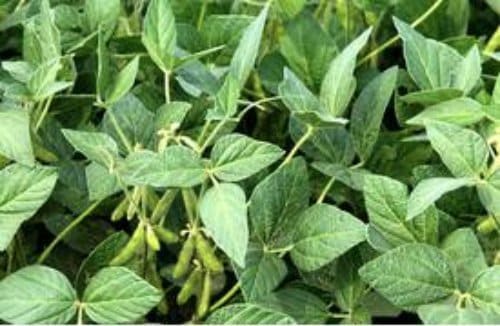 SOY fabric is a by-product of pressing beans to make soybean oil. The bean cake is spun into a fiber with a polyvinyl alcohol solvent in a closed-loop process. The result is a fabric that is so soft, it is called soysilk or vegetable cashmere.
SOY fabric is a by-product of pressing beans to make soybean oil. The bean cake is spun into a fiber with a polyvinyl alcohol solvent in a closed-loop process. The result is a fabric that is so soft, it is called soysilk or vegetable cashmere.
A company in China patented the process in 1999 – even though Henry Ford once used soy wool to upholster the seats of his cars. He also wore a soy wool suit.
Studies show that soy absorbs moisture, resists bacteria and UV rays. The bad news: Soy is one of the most genetically modified plants. Clearing land for this crop is one cause for the loss of Amazon rainforest.
- Fabrics: Mostly knits. Sometimes blended with cotton and spandex.
- Best use: More durable than bamboo. Use for tops and casual jackets for both adults and children.
- Sewing tips: Treat soy knits as you would interlock knits.
- Care: Pre-shrink. Machine wash and line dry.
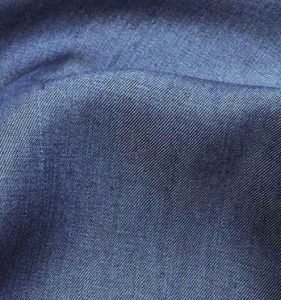 TENCEL® is a brand name for Lyocell — a synthetic fiber made from wood pulp. A solvent breaks down the pulp into a solution called “dope.” The dope flows through the fine tips of spinnerets and dries into fibers. Washing retrieves the chemicals so they can be reused. Tencel is made in the U.S.
TENCEL® is a brand name for Lyocell — a synthetic fiber made from wood pulp. A solvent breaks down the pulp into a solution called “dope.” The dope flows through the fine tips of spinnerets and dries into fibers. Washing retrieves the chemicals so they can be reused. Tencel is made in the U.S.
- Fabrics: Wovens and, more recently, jersey knits. All have a supple hand that’s silky and suede-like. Tencel drapes well and dyes easily.
- Best use: Use the wovens as you would cotton, linen or rayon for casual pants, jackets and skirts.
- Sewing tips: Use a nap layout with wovens. Serge the cut edges with a two-thread overlock or zigzag stitch. Sew seams with a straight stitch and press flat with the iron on medium heat. Use knit interfacing and understitch. Sew with a stitch length of 3.0.
Treat tencel knit as you would jersey knits.
- Care: Machine wash; hang to dry. Tencel woven can wrinkle but is easy to press or steam.
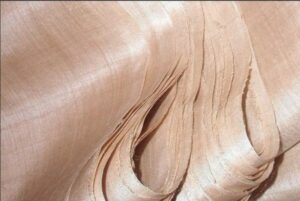 PEACE SILK. Silk is one of the oldest known natural fibers. Most silk originates in China, India and Southeast Asia. It is considered by many to be an organic fiber. Domestic mulberry silkworm pupae spin it.
PEACE SILK. Silk is one of the oldest known natural fibers. Most silk originates in China, India and Southeast Asia. It is considered by many to be an organic fiber. Domestic mulberry silkworm pupae spin it.
Commercial growers pierce, boil or suffocate the pupae to kill them before they emerge as adult moths. That way, the cocoon can be unraveled as one long continuous unbroken thread.
Peace silk allows the moth to eat a hole in the cocoon to emerge. The hole makes it impossible to unreel the cocoon. So the fiber must be spun. The result is a more matte finish with a rougher look. Peace silk is also called wild silk.
- Fabrics: Wovens, knits. Peace silk typically is a woven.
- Best use for peace silk: Blouses, skirts, scarves. Underline to make lightweight jackets.
- Sewing tips: Treat peace silk as you would a charmeuse. Check the fabric for nap and color variations. Avoid making too many pin or needle holes. Use weights to hold the pattern to the fabric. Pin in seam allowances with fine needles. Cut with sharp scissors rather than rotary cutters.
Hand baste slippery or difficult seams to avoid any seam ripping later. Use size 8 universal machine needles and a stitch length of 2.5. If you want to press the seams open, pink the raw edges to finish them. Otherwise, sew narrow French seams. Hold the seam taut while sewing to prevent puckers. Use a warm, dry iron and press seams lightly over a seam roll to prevent the seam allowance from indenting the fabric.
- Care: Gentle wash in cold water; hang to dry. Peace silk is not as strong as regular silk and can pill after several uses.
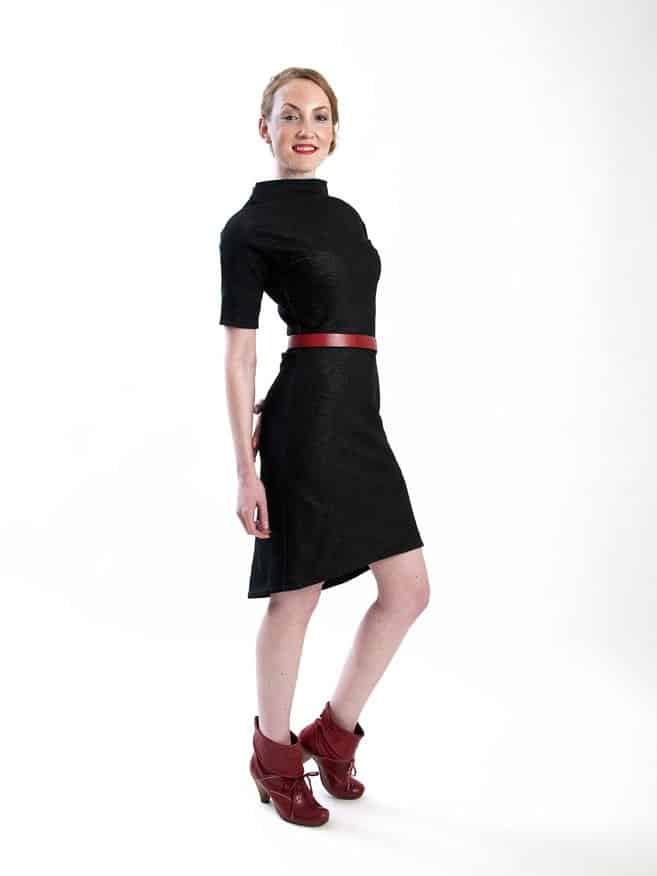 ORGANIC COTTON is grown worldwide, particularly in southwest U.S. Organic cotton does not use chemical pesticides, fertilizer or other toxins. Some is “colorgrown.” The bolls come in natural colors such as mocha, sage or honey, rather than white. Other organic cottons use fiber-reactive, low-impact or plant dyes. But growing any cotton, conventional or organic, uses a great deal of water.
ORGANIC COTTON is grown worldwide, particularly in southwest U.S. Organic cotton does not use chemical pesticides, fertilizer or other toxins. Some is “colorgrown.” The bolls come in natural colors such as mocha, sage or honey, rather than white. Other organic cottons use fiber-reactive, low-impact or plant dyes. But growing any cotton, conventional or organic, uses a great deal of water.
Wal-Mart buys more organic cotton than anyone else in the world.
- Fabrics: Wovens, fleece, knits. Most durable of the sustainable knits.
- Best use: Jackets, tops and dresses.
- Sewing tips: Treat as you would any other cotton. Use size 12 universal needles for wovens and size 12 stretch for knits. Overlock knits with wooly nylon in the upper looper.
- Care: Machine wash; hang to dry.
Organic Cotton Knit Dress WANDERING MUSE
Two that are newer to the sustainable scene:
PLA– or polylactic acid – is an organic polyester made from plant sugars. The sugars come from corn, cane, beets or wheat. The fabric composts to dirt within 90 days with 140ºF and 98 percent humidity
It attracts and wicks moisture then dries quickly, making it good for activewear. It also protects from UV.
Most PLA comes from chemical manufacturer Cargill Dow under the trademarked name Ingeo. Ingeo uses, in part, genetically modified corn. Right now it is only available commercially and is used by apparel companies such as Nike and Nau.
PET– or polyethylene terephthalate – is a polyester fleece made from recycled plastic bottles. It was first developed in the 1990s as EcoSpun. Patagonia used it to make jackets and vests.
A new process EcoPET creates a filament that can be woven into knits as well as fleece. Most EcoPET is made in Japan. Most is sold to manufacturers of T-shirts, thermal underwear, outerwear and sports garments.
Consumers can buy PET on-line as EcoFelt.
Online sources for eco-fabrics:
Aurorasilk.com – Naturally dyed peace silk, hemp, organic cotton knits and wovens
bamboofabricstore.com – Bamboo and bamboo blends
bamboofabricstore.com.au – Bamboo, soy and hemp blend wovens with cotton and nettle, bamboo jersey
fabricandart.com – Hemp and hemp blend wovens, hemp blend jerseys, bamboo, cotton and soy blend jerseys and spandex blend knits, organic cotton wovens including colorgrown
hartsfabric.com – Bamboo dobby, organic cotton wovens, EcoFelt, seacell (made from seaweed) and organic cotton blend voile
hempfabricshop.com – Hemp canvas and twill
hemptraders.com – Hemp and hemp blends
jascofabrics.com – Organic cotton crepe knit, organic wool jersey, interlock and twill
nearseanaturals.com – Organic cotton jersey, French terry, fleece and blends, organic cotton wovens including colorgrown, hemp and hemp blend wovens, peace silk
wazoodle.com – Bamboo jersey and fleece, organic cotton jersey




